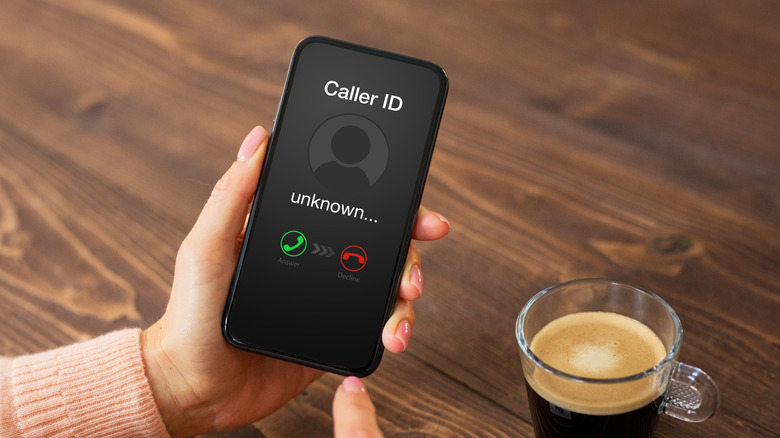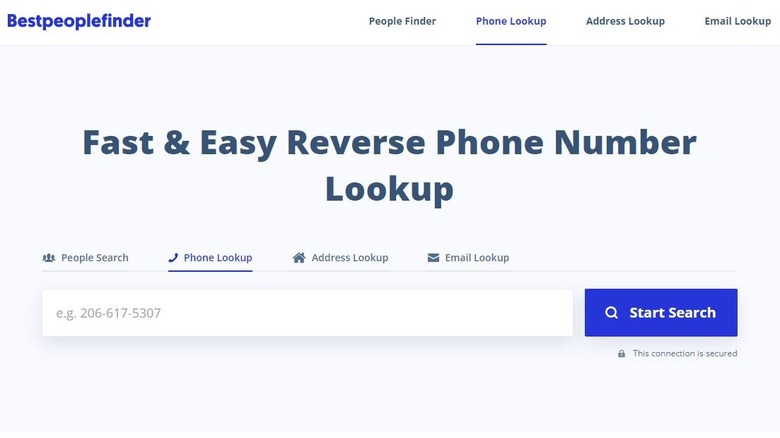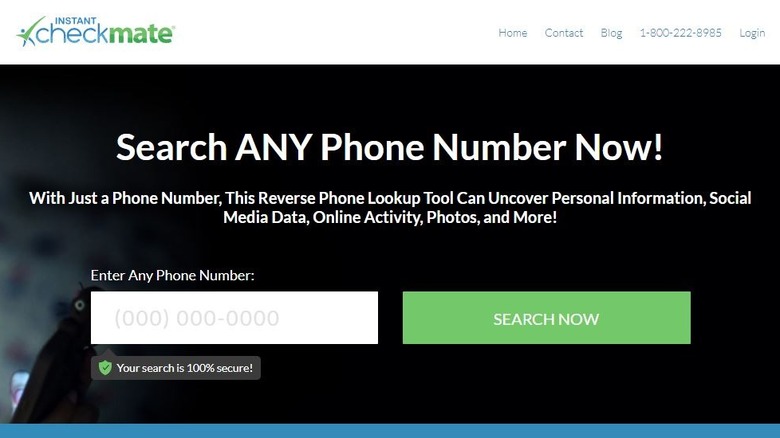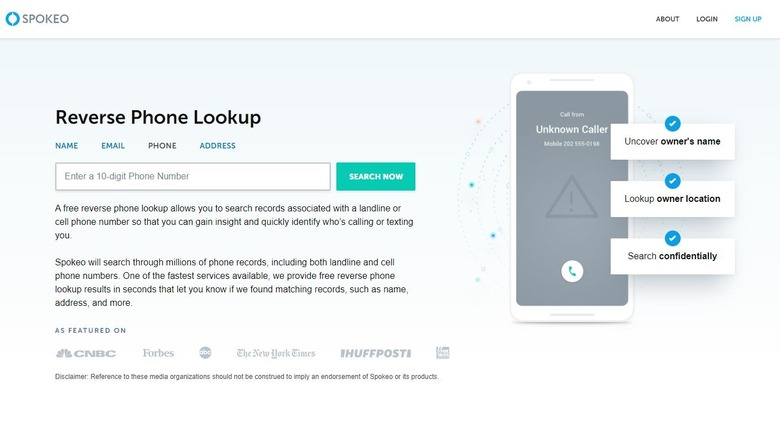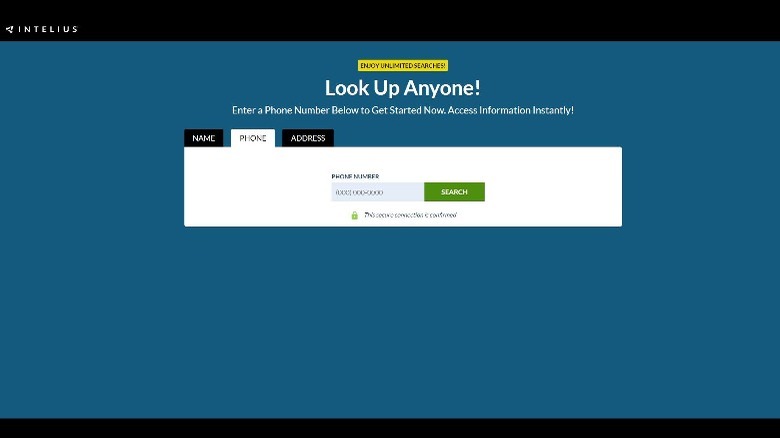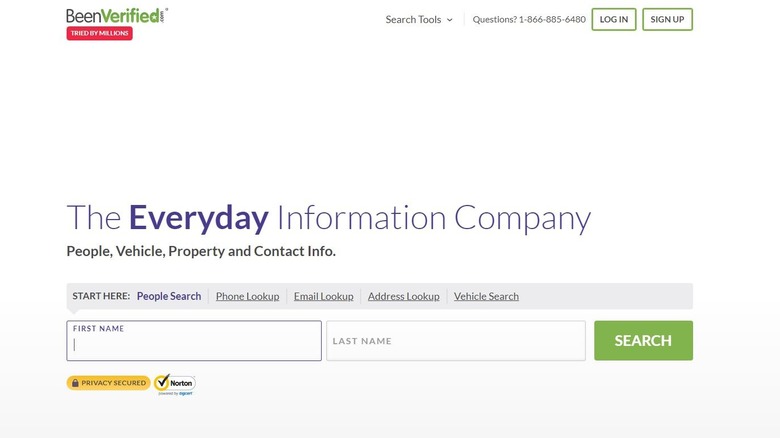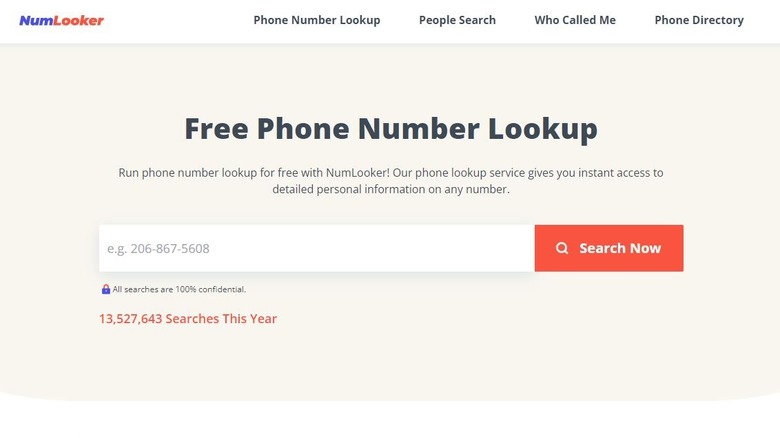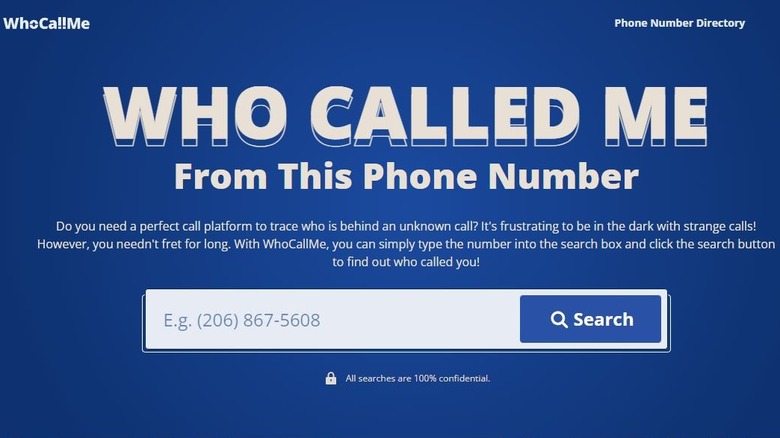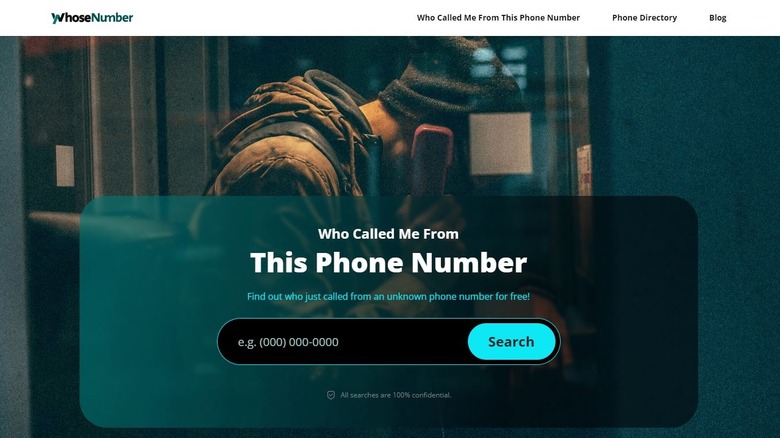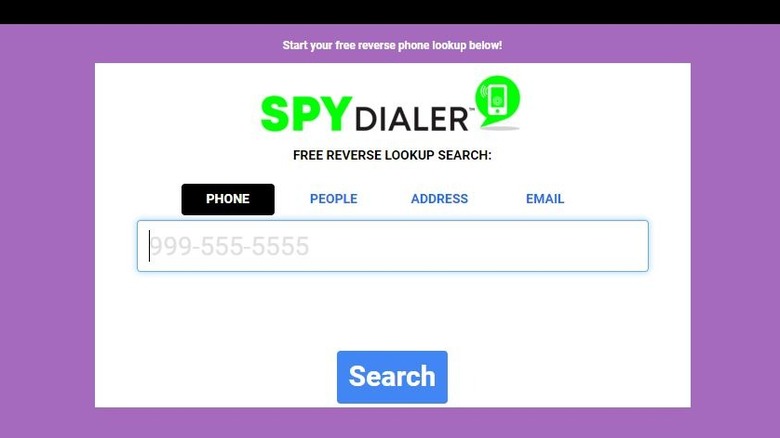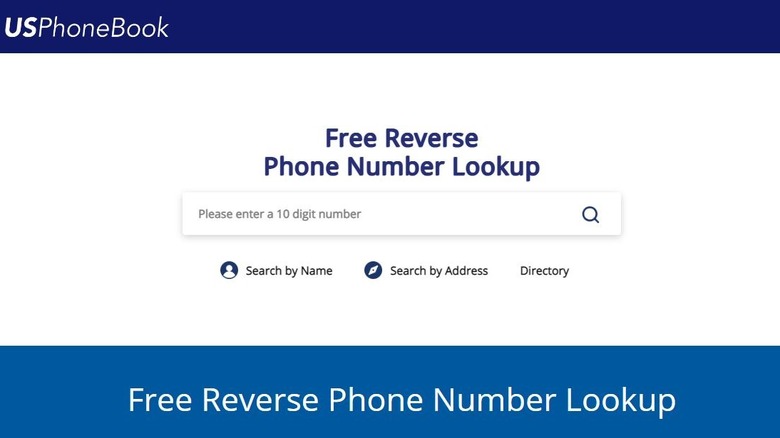10 Free Reverse Phone Number Lookup Sites To Figure Out Who's Calling
In the long ago era of a few decades ago, the only reliable way to get a phone number was to get it straight from the person you wanted to contact or from the phone book, if they were listed. The downside was that you couldn't just reach whoever you wanted, whenever you wanted. The upside was that if your phone was ringing, the odds were it was someone you actually wanted to talk to. Or, at the very least, someone you knew.
Today, however, in the age of data collection, your contact information gets passed around like baseball cards, resulting in what can feel like a near-constant deluge of calls from unknown numbers. It can get bad enough that many of us have just stopped answering if the caller isn't a known contact. Sometimes though, you might want to know who keeps calling you, so you can decide if you want to engage with them — without having to call them back first.
There are a number of services floating around online that will provide you with detailed information about a person or entity, using only the phone number or another piece of identifying information, for a fee. But you shouldn't have to pay just to know who keeps bothering you. These are the best free services for turning unknown numbers into known ones.
How a reverse phone number lookup works
The magic behind a reverse phone number lookup relies on a few sources of information. The first is publicly available information. Most businesses list their phone number online and finding out who a number belongs to can be as easy as a Google search. That's the first and easiest place to start.
If that leaves you still scratching your head, that's when a reverse lookup tool can come in handy. For the most part, these come in two varieties. The first kind scours public records to compile a report that can include everything from name and address to social media profiles, photos, relatives, and more. These services typically come with a warning up front, cautioning you that you might not like what you find.
Other sites are collaborative and rely on user data. If and when you get a call from an unknown number, you can add information about it for the next person. Likewise, you can get information about the person calling you now, as long as someone else has documented the number before. The method you choose will largely depend on the sort of situation you're facing and the level of information you want to retrieve. If you're planning to dig deep, the warning to tread carefully is probably warranted.
BestPeopleFinder
BestPeopleFinder is representative of the sorts of services you're likely to find readily available online. It uses a single piece of identifying information (name, phone number, address, or email) to find a person and connect them with other pieces of information. In practice, that means you can type in an unknown phone number and potentially find out who it belongs to.
After entering a phone number and clicking Enter, you'll be redirected to one of a number of third-party services which actually provide the information. Consequently, the results you receive may vary. All of that notwithstanding, we were able to retrieve accurate information in tests with known contacts. Most of that information, however, is locked behind a paywall.
Using the free service returned only the first letter of the first name, as well as the city and state of the number's owner. Additional information is available for a fee. If you don't want to hand over your payment information, the free functions may still be useful if you want to validate a caller you already suspect. It may not be as helpful if you have no idea who is calling you.
Instant Checkmate
The first thing you'll see on Instant Checkmate's phone lookup landing page is a warning. It cautions that the report could contain graphic information including images. This is only the first warning of this kind you'll encounter before you reach the end of this process.
After clicking that you understand, you can enter your mystery phone number and click search. You'll have to confirm the search a second time, along with another warning. Next, you enter a waiting room while the report is gathered. This process takes a few minutes and a green bar at the top of the screen charts your progress. Meanwhile, continuous warning scroll across the screen, reminding you in various ways that what is seen cannot be unseen. Everything from the name to the messaging makes clear that Instant Checkmate is aimed at folks trying to validate infidelity or some other betrayal.
Finally, the site confirms that information has been found and gives you one more chance to back out. You'll also have to confirm that any information you receive won't be used for hiring, insurance, or rental decisions. With all of that confirmed, Instant Checkmate delivers a report preview that includes the wireless carrier if available, as well as the city and state. Additional details, unfortunately, require payment.
Spokeo
Spokeo has one of the simplest interfaces of all the reverse lookup sites we tested. It returns results quickly and doesn't make you jump through hoops, enter any signup information, click through a bunch of pop-ups, or redirect you someplace else. Those are the positives; the major downside is that free information is limited.
A report is generated in only a few seconds, at which point you're given a report preview. The preview tells you what the report contains but doesn't actually reveal that information. In tests, the preview came back with the full name, current address, location, known relatives, previous addresses, line type (landline or wireless), and wireless carrier, if applicable. The only information revealed in the preview is the line type and the carrier. Everything else is hidden.
Getting your eyes on the rest of the information will cost you 95 cents. You'll also get a seven-day free trial, allowing you to make additional searches. Just make sure you cancel before the week is up if you don't want to keep the service. The cost goes up dramatically once the trial ends.
Intelius
Intelius takes steps right up front to make sure you know the sorts of information you might receive. Step one is entering a birth year to confirm you are at least 18 years old — that's because of the potentially graphic nature of the report. In addition to a name, the report could include current address, social media profiles, photos, and more.
After entering a phone number, it takes about a minute and a half to gather information. During that time, you'll be treated to a number of messages, reminding you about the sorts of information you might receive, giving you yet another opportunity to change your mind. Next, you'll confirm that you're not a robot and enter a name and email address. Another warning, and reassurance that your search is secure is all that stands between you and the report preview.
The preview shows you the carrier, the line type, the city, and the state. Additional information, including the owner's name, is in the full report. Clicking through to the full report initiates a few more seconds of loading and requires you to confirm that you won't use the information for consumer credit, employment, insurance, tenant screening, or anything else requiring FCRA compliance. You'll also have to confirm that you won't use the information to harass or stalk anyone or do anything dangerous to you or others.
The full report and a six-day trial are yours for 95 cents, after which the monthly cost increases to $34.95.
BeenVerified
If you're looking for an easy-to-use interface that doesn't make you jump through a lot of hoops, BeenVerified has that going for it. You don't have to provide any personal information upfront. The only thing the site asks you for is the phone number you want to look up. Results start coming in immediately and the site delivers a likely owner while the rest of the report is still loading.
The likely owner, however, is mostly blocked out. It will give you a couple of letters, including the first letter of the first name and a middle initial if there is one. You're then presented with a standard warning that you won't use the information for anything that requires compliance with the Fair Credit Reporting Act (FCRA) including employment, rental, or credit-related decisions.
Once confirmed, BeenVerified shows you the city and state of the user, alongside the mostly censored name. All additional details require a plan. There are trial offers starting at a dollar, which include the requested report and a seven-day trial membership. Your trial is limited to 100 reports in the first seven days, after which you are billed $26.89 plus tax.
NumLooker
Similar to some other reverse lookup services, NumLooker utilizes a number of third-party sources to get the information you're looking for. That means that the precise user experience may vary from number to number or from search to search.
During tests, NumLooker would sometimes ask for additional information, like the owner's city, if you happen to know it. If not, you can always skip the question. NumLooker then searches through public records looking for everything from traffic stops to arrests, known relatives, social media profiles, and more. The bottom line is it takes a few minutes for all of the information to come together, most of it you don't need if all you want is to know who is calling you.
In some instances, the search may return multiple matches. If that's the case, you'll have to provide more information to narrow the results down. Once it finds the right person, you'll get some basic information like a letter or two from the full name, as well as location. In our tests, the information returned was free and accurate, but limited. Getting the full report comes with a cost.
Who Call Me
Those three words might sound like Tarzan's voicemail greeting, but the simple and stilted naming convention is indicative of the service Who Call Me offers. The interface is intuitive and easy to use, and it won't ask you for any personal information or to click through a dozen pop-ups. The simplicity of the site is both its greatest strength and biggest weakness.
Unlike other reverse number lookups, which rely on public records and information combed from the internet, Who Call Me relies on user-submitted data, which seems to make it most useful for scam callers. Because it relies on user submissions, you're not going to find anything unless someone else has encountered the same number before and taken the time to share what they know. Finding nothing may be a disappointing result, but it is also an opportunity to help the next person by sharing whatever you know about the number.
If your search does return results, it can include a name, user comments, and even audio recordings. There is also an option to click through for a full report, which redirects you to a third-party source, often one of the other sites on this list.
Whose Number
Whose Number offers a simplified interface and simple results. The landing page offers a search field for a 10-digit number and a big, glowing search button. Clicking moves you to the results page immediately. There is no wait time because the site isn't gathering data from anywhere.
Instead, all of the data on the site is user generated. The idea is for a community of curious folks to build a database of previously unknown numbers, together. The upshot is that results are immediate and free. The downside is that information is spare, limited only to the caller's name and type. Numbers can be designated as a debt collector, political caller, prank caller, survey, telemarketer, and more.
One of the site's coolest features is the estimated threat level. That level is based on the information collected by prior users and is presented on a color-coded scale from low to high. With two shades of green, yellow, orange, and red, it's easy to immediately know if the number that's calling you is a minor annoyance or something you should be more concerned about.
Of course, if no one has submitted information on the number you're looking for before, then you're not going to find anything. If that's the case, you can click through for a full report, which redirects to another reverse lookup service.
Spy Dialer
Spy Dialer doesn't have all of the bells and whistles some other options offer. You're not going to get a complete address and social media profiles, but you probably don't want or need that. Instead, Spy Dialer gives you exactly what you're looking for — quick and reliable information about an unknown phone number. What it lacks in complexity it more than makes up for in ease of use and results.
On the landing page, make sure the phone option is selected, and type in the 10-digit number you're looking for. You'll end up on another page which a message which reads, "You entered cell number" followed by the number. Underneath, you'll have four options: Hear voicemail, Name Lookup, Photo Lookup, or Phone Spam. Make sure Name Lookup is selected and click Search. Be careful not to enter the number into any other fields, which may be advertisements in disguise.
Click search and Spy Dialer will take a few seconds to gather your information. You'll get the full name, city and state, and the wireless provider. You can also click through various options for more information, including a sample recording of the outbound voicemail message, if available. There is no cost, and you don't have to sign up for a trial or a profile.
USPhoneBook
This is hands down the best reverse lookup tool we tested, and we tested dozens of them. As the name suggests, it is limited to phone numbers from the United States and may have limited use for folks living outside of the U.S. That said, the experience and results for U.S. numbers is unmatched.
Results are returned immediately, as soon as you enter the phone number. There is nothing to confirm, no personal information for you to enter, and no pop ups to click through. USPhoneBook instantly returns the full name alongside the phone number, as well as a spam or fraud potential indicator.
If the name is all you needed, then you're done. If not, there is a button to click for more details. Once again, there are no spammy-looking advertisements or suspicious redirects. Most importantly, you don't have to pay for anything. The expanded report gives full name, age, current address, prior addresses, known relatives and associates, email addresses, and more. The level and amount of information may vary from person to person, depending on what is publicly available, and it may change over time. With that in mind, there is an option to sign up for updates.
If the ease with which you rustled up information about a stranger freaks you out, there is a process for opting out of USPhoneBook and having your information removed.
